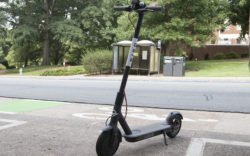Georgia’s state legislators have the power to kill local initiatives they don’t like, and have done so in the past—ending local regulation of cable companies, for example, and preventing ACC commissioners from raising a tax on hotel rooms. Locals also accuse legislators of burdening them with “unfunded mandates”—requirements that cost them money to fulfill. A perennial frustration to ACC commissioners has been their inability to lower speed limits on some neighborhood streets—state permissions favor the status quo.
As they do twice a year, Athens-Clarke County commissioners met last week with Athens’ state legislators and gave them a wish list of changes they’d like to see at the state level. It was quite a list, and the mostly Republican delegation representing mostly Democratic Athens (through the miracle of gerrymandering) was mostly noncommittal.
In addition to authority over speed limits, decriminalizing marijuana possession and septic tank maintenance regs, commissioners asked for a laundry list that included allowing undocumented immigrants to drive legally, higher wages for the lowest-paid university system employees and limits on wealthier people getting HOPE scholarships. In addition, people have died in Athens as a result of Georgia’s failure to expand Medicaid (as most other states have done), commissioners said.
State Rep. Spencer Frye (the lone Democrat) called it “a great list” and said a compromise on Medicaid access for Georgia’s poor is “closer than we’ve ever been.” But Republican Sen. Bill Cowsert was dismissive of the commissioners’ list, insisting that the items on it were not “uniquely local” to Athens or “specific to your jobs” as elected officials. Commissioner Melissa Link disagreed, citing half a dozen items where state rules preempt local powers: “Over and over again, we get requests from constituents, and we’re like, ‘Sorry, we can’t help you, the state won’t allow us to do that,’” she said. “Just let us do our jobs as a local government.”
A small downtown park is proposed for the corner of Lumpkin and Washington Street, which is presently a county-owned parking lot overlooked by the new mural that depicts the cultural history of Hot Corner. A design for the proposed mini-park—an off-street “gathering space”—is being developed by the Athens Downtown Development Authority. Commissioners saw a preliminary plan with seating, trees and a small stage. They asked for more shade, play spaces for kids and perhaps a fountain or water wall. “I love the idea of a fountain kids can play in,” Commissioner Patrick Davenport said.
Public input will be sought as plans advance, and the design could be completed within a year, ADDA co-director David Lynn said. Surface parking lots downtown are “too valuable” to be used merely for parking, Lynn said; they should all be converted to public or commercial uses.
Additional plans for that block of Washington downhill from City Hall could include renovating the former bus-stop kiosk into a narrow diner-style restaurant. The plaza that tops the recessed kiosk building “could be a really interesting sidewalk cafe,” he added. And the county-owned Costa Building (the former police station) could house street-level commercial plus upstairs offices, as suggested by the Downtown Master Plan, Lynn said.
Also at last week’s work session, commissioners were mostly skeptical about the need for a new sewer line to serve an area between Commerce and Danielsville Roads. The area is not served by sewer—homes, businesses and Fowler Drive Elementary School are all on septic tanks. A sewer line has long been proposed by ACC’s Public Utilities Department, but sewer lines bring development, and commissioners have resisted encouraging development in the environmentally sensitive area around Sandy Creek. They canceled the proposed line in 2010 but last year agreed to serve the planned amphitheater on Commerce Road with a dedicated “force main,” a sewer line that will not allow others to tap in.
Septic tanks work fine, usually, and should be pumped every three to five years, officials recommend. But many homes in the area were built on lots too small to properly accommodate septic tanks, because if they fail, there is no room for a new drainfield. And some may be failing, or at least need pumping more frequently. Besides backing up sewage, a failing tank can flow onto the ground and pollute waterways, though Sandy Creek apparently has not been affected.
A sewer line could replace failing tanks, but commissioners noted that sewer lines can leak, too—and have, to the tune of 400,000 gallons in the past two years. That’s typically because of grease, said acting PUD Director Glenn Coleman, and old lines that will soon be replaced. But commissioners also pointed out that they had voted for $5 million to fix failing septic tanks four years ago, and none of it has been spent. That’s because no failures were “imminent,” county Manager Blaine Williams said. Even if a line were built, homeowners might not connect—it costs over $3,000 to do so. Coleman, who had conferred with local conservation groups, said the line could avoid wetlands, and the deteriorated Cook’s Trail could be rebuilt in the bargain.
Some commissioners were suspicious. “Is this actually an economic development project, or is this an infrastructure project?” Link asked. “There’s all kinds of rumors” of proposed developments in the area, said Commissioner Jerry NeSmith. Developers “would be tickled pink to see a sewer line,” added Commissioner Russell Edwards. Coleman said he knew of no proposed developments. “I would like to see us invest time and energy in figuring out how to regulate septic tanks,” perhaps requiring regular pumping, said Link.
Like what you just read? Support Flagpole by making a donation today. Every dollar you give helps fund our ongoing mission to provide Athens with quality, independent journalism.










